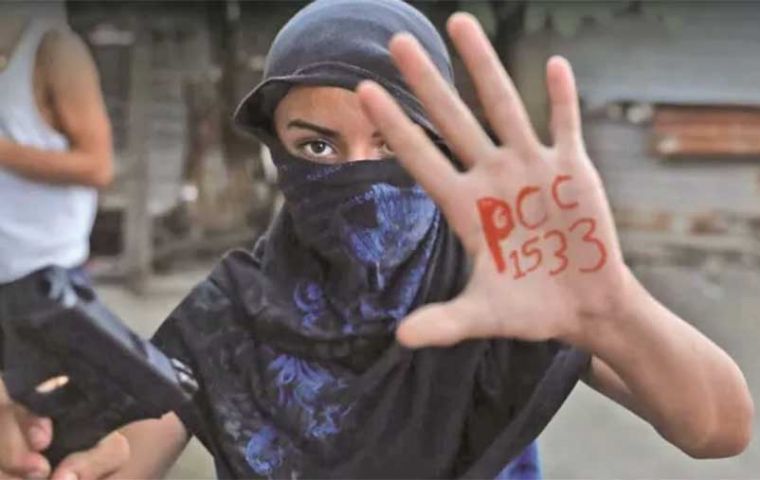MercoPress. South Atlantic News Agency
Drug trafficking gangs: Brazil's PCC operating in Chile
 The PCC Chile branch is headed by Juan Bayron Nataly Santander, alias “Pelado”
The PCC Chile branch is headed by Juan Bayron Nataly Santander, alias “Pelado” Following a confession from a Chilean prison inmate, it was determined that São Paulo's notorious First Capital Command (PCC) had expanded its operations, it was reported in Santiago. In addition, raids in correctional facilities in Brazil detected communications further corroborated the news since proof of communications between the two countries was detected.
According to local media, the PCC Chile branch is headed by Juan Bayron Nataly Santander, alias “Pelado,” backed by Brazilian Lucas Leonardo de Oliveira Santos, known as “Negrinho.” The gang is said to be seeking to expand its arms and drugs trafficking business, it was explained. Paraguay's Prosecutor's Office said that there were Chilean nationals involved in a recent high-profile robbery in Ciudad del Este (CDE).
The 35.000-strong Brazilian gang linked to the Aragua Train was also said to be in Chile since 2022. A Carabineros report also noted that it was present in many other South American countries, outsourcing criminal services where they provide logistical support and human resources.
“There have been some antecedents that have triggered the opening of an investigation in this matter, we have to wait for the investigation to establish if there are indeed these links or if there are people from this gang operating in Chile or if they simply have agreements with local gangs. This is a matter that is being investigated by the Investigative Police,” Chile's Interior Minister Carolina Tohá said.
“The PCC is a criminal organization that has a presence in several Latin American countries that has a strong content in drug trafficking, but also in others,” noted Ignacio Castillo, Director of Chile's National Prosecutor's Office Unit Specialized on Organized Crime.
The PCC was created in 1993 after a massacre at the Carandirú prison in December of the previous year when 111 inmates were killed. In response, 8 prisoners at the Teoaté facility made what would evolve to become the First Capital Command, under the inspiration from Rio de Janeiro's Red Command.
In the beginning, it sought to defend the human rights of inmates in Brazilian prisons under the motto: freedom, justice, and peace, but later on, other activities were added to the gang's curricula.




Top Comments
Disclaimer & comment rulesCommenting for this story is now closed.
If you have a Facebook account, become a fan and comment on our Facebook Page!